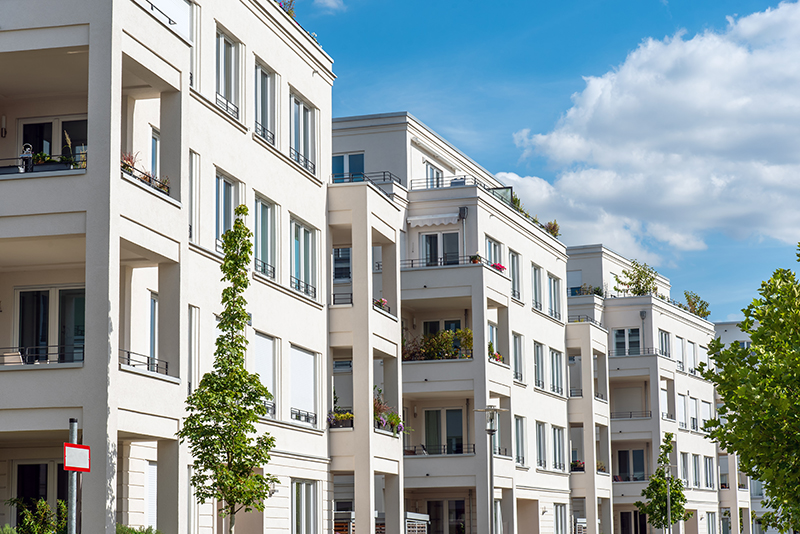As the prices of single-family homes increased over the past year, many real estate investors tested the waters of investing in condominiums. As we step into the 2019 real estate canvas, home prices are expected to stabilize, if not dip in some market. That doesn’t mean, however, that investors should write off investing in condos. There are a number of benefits that come with investing in the properties. We’ll walk through the positives and negatives of investing in condos so you know if this is an element to add to your portfolio.
Pros of Condo Investing
- Less Maintenance
If you don’t have the time or cash sitting around to replace a roof or paint the outside of a single-family home, condo living is ideal. From cutting the grass to cleaning the pool, condo maintenance is handled for you by the building owners or management company. Your maintenance responsibility typically falls within your walls. Read the condo by-laws and regulations as buildings can vary, but usually anything beyond what you can see inside the condo is not your responsibility.
- Amenities
Many condominium buildings will offer a swimming pool, spa, and fitness center. In addition, weekly game night and summer BBQs are a great way to get to know your neighbors and enjoy all that condo-living has to offer. Tenants of your unit will appreciate the amenities offered that are difficult to find or very costly with single-family homes.
- Security
High-tech security systems, doorkeepers, and front desk personnel who monitor incoming guests all help keep condo residents safe. For young professionals or empty nesters who are constantly traveling, the added security is a nice feature in a rental unit.
- Affordability
The National Association of Realtors (NAR) reports the average single-family home sold for $260,000 in August 2018. Comparatively, the average condo sold for $248,200. Market will differ, but the asking price for a condo is typically less expensive that single-family units in the same area.
Cons of Condo Investing
- HOA Fees
It’s normal for a single-family home to come with monthly or yearly HOA fees, but condo fees can be more extravagant. The added security, swimming pool, and maintenance all need to be funded, and that’s where HOA fees come in. According to research by Trulia, the average housing association fee for a condo in 2017 was $331 per month. The fees may deter some renters.
- Lack of Privacy
Living in a condo means your tenants will be surrounded by many neighbors. While some renters are buyers like the idea of an instant community, others may wish for more space and privacy.
- Live by the Rules
The condo building rules can be, well, lengthy. Some changes you or your tenants want to make may need to be approved by the property management group or not permitted at all. Rules may include no pets, limited visitors, or strict quiet times to avoid disturbing other residents.
Investing in condo properties may be a financially beneficial move for your portfolio. Research your local real estate market for availability, affordability, and a desirable locale for condos. A low-maintenance home is ideal for many people, so turn to your real estate partners to gauge interest on the desire for this type of property.
- Less Maintenance
If you don’t have the time or cash sitting around to replace a roof or paint the outside of a single-family home, condo living is ideal. From cutting the grass to cleaning the pool, condo maintenance is handled for you by the building owners or management company. Your maintenance responsibility typically falls within your walls. Read the condo by-laws and regulations as buildings can vary, but usually anything beyond what you can see inside the condo is not your responsibility.
- Amenities
Many condominium buildings will offer a swimming pool, spa, and fitness center. In addition, weekly game night and summer BBQs are a great way to get to know your neighbors and enjoy all that condo-living has to offer. Tenants of your unit will appreciate the amenities offered that are difficult to find or very costly with single-family homes.
- Security
High-tech security systems, doorkeepers, and front desk personnel who monitor incoming guests all help keep condo residents safe. For young professionals or empty nesters who are constantly traveling, the added security is a nice feature in a rental unit.
- Affordability
The National Association of Realtors (NAR) reports the average single-family home sold for $260,000 in August 2018. Comparatively, the average condo sold for $248,200. Market will differ, but the asking price for a condo is typically less expensive that single-family units in the same area.
- HOA Fees
It’s normal for a single-family home to come with monthly or yearly HOA fees, but condo fees can be more extravagant. The added security, swimming pool, and maintenance all need to be funded, and that’s where HOA fees come in. According to research by Trulia, the average housing association fee for a condo in 2017 was $331 per month. The fees may deter some renters.
- Lack of Privacy
Living in a condo means your tenants will be surrounded by many neighbors. While some renters are buyers like the idea of an instant community, others may wish for more space and privacy.
- Live by the Rules
The condo building rules can be, well, lengthy. Some changes you or your tenants want to make may need to be approved by the property management group or not permitted at all. Rules may include no pets, limited visitors, or strict quiet times to avoid disturbing other residents.
Investing in condo properties may be a financially beneficial move for your portfolio. Research your local real estate market for availability, affordability, and a desirable locale for condos. A low-maintenance home is ideal for many people, so turn to your real estate partners to gauge interest on the desire for this type of property.


